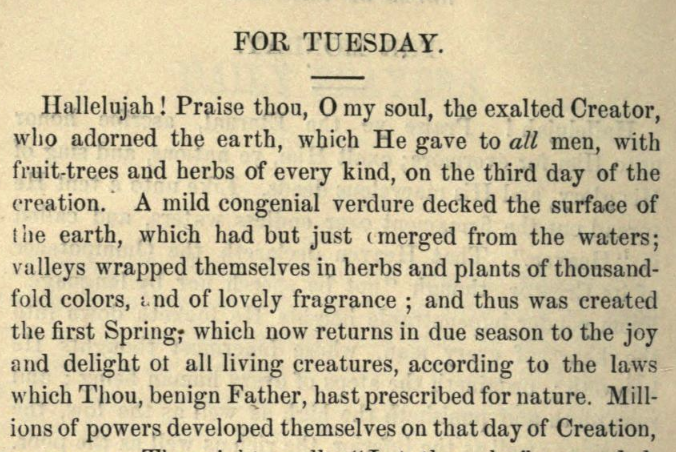| Contribute a translation | Source (English) |
|---|---|
Omnipotent God! whose wisdom and goodness every season of the year proclaims, consecrate within us on this day of Tabernacles the emotions of gladness, which the delightful enjoyment of the rich and bountiful gifts of Nature awaken in our souls. Whatever physical good we could only hope and wish for in the days of the swiftly fled Spring— affluence for the present, and plentiful blessing for the future— the powerful Summer and the mild Autumn have bestowed upon us in full measure, and thus elevated our mind to sublime reflection. | |
Yea, Father of the Universe, even the Autumn is a proclaimer of Thy divinity; even the Autumn preaches to us Thy providence for all living creatures, reminds us of a higher destination, points through the example of dying Nature, to the perishableness and decay of all that is earthly. Where is now the refreshing verdure which but recently adorned the lawns and meadows? Where are the variegated flowers, the balmy fragrance of which but shortly revived since thousands of Thy creatures?— None of these are to be found any more— all have returned to their dust. Equally perishable and decaying is all earthly happiness which smiles on man to day, and forsakes him to morrow. O what an important and eloquent appeal is this to us, never to overrate earthly treasures, never to prefer worldly possessions to those which are infinite and everlasting. | |
And, however numerous and convincing are the proofs of the perishableness of all earthly possessions, urged upon us by the Autumn, it is, at the same time, like every other change in Nature— a clear and irrefutable token of Thy omnipotence and all-goodness. | |
Yea, Eternal! it is Thy hand which has bared the shadowing woods and the voluptuous fields and meadows of their beautiful ornaments, but not ere the same bountiful hand had first blessed us with plenty, and satisfied our wants. For not only the playful delight of the eye, but also the enjoyment of useful fruit was the production of Thy nature. Everything greened, in order to blossom— blossomed, in order to ripen— ripened, in order to provide nourishment and strength for millions of creatures. May the destructive Winter annihilate their decayed remains; they have performed their vocation, and fulfilled the purposes of their Divine Creator. | |
To what important reflections on ourselves, and to what useful examination of our being, must not these processes in Nature lead us! Within ourselves, also, a union of powers exists, which keep our mind in constant motion— our will in uninterrupted activity. We also bloom physically and mentally, to mature in the Autumn of life for this and a future world. | |
Did we have the destruction before our eyes, previous to every action of ours, which every tree, every leaf, calls to our mind? or have we, through diligence and energy, become that which our natural abilities and capacities enable us to be? Or have we allowed our powers to slumber, instead of developing and exercising them? Or have we, by our vices, become destroyers of the peace and happiness of our fellow creatures, which, according to the benevolent purposes of Thy creation we were destined to promote? | |
With what emotions must we then look upon the autumnal tree, which, at least afford shade to the weary wanderer, and receive the birds of heaven under its branches; whilst we, instead of comforting the sufferer and protecting the oppressed, have been their opponents? With what self-reproach must we not look down upon the withering plant which has, at all events, done all that it could and should do; whilst we, instead of proceeding in the path of perfection, for which we were destined, have sunk back deeply in the slavery of sin and in the bondage of vice. | |
O, Inexhaustible Source of Wisdom and Virtue! grant that the Feast of Tabernacles and the Festival of the Harvest, which we celebrate this day, may awaken within me these and similar pious reflections; that they may always direct my attention to thy infinite wisdom and goodness, when I contemplate the nature of the changes in creation; in order that even when it be Thy will that the happy prospects into flowery valleys shall fade, the sweet and refreshing hope of Thy speedy salvation may not depart from me. Amen. |
“Prayer of Thanksgiving for the Feast of Tabernacles (סכות)” by Marcus Heinrich Bresslau was first published in his תחנות בנות ישראל Devotions for the Daughters of Israel (1852), p. 35.
In his preface to Devotions, Bresslau is clear that his prayers in English were adapted from traditional teḥinot that had earlier been published in France, Germany, and Poland. If you know of a specific prayer that may have served as the basis for this one, please leave a comment or contact us.
Source(s)


“Prayer of Thanksgiving for the Feast of Tabernacles (סוכות), by Marcus Heinrich Bresslau (1852)” is shared through the Open Siddur Project with a Creative Commons Public Domain Dedication 1.0 Universal license.










Leave a Reply